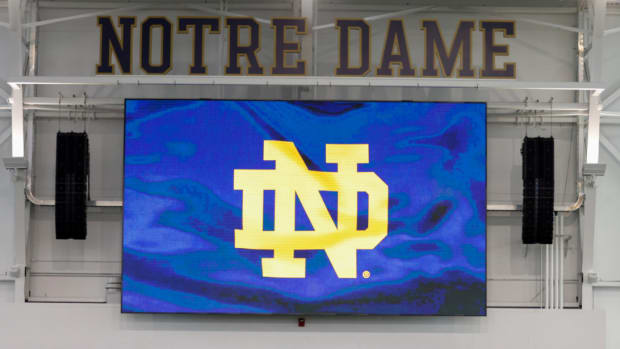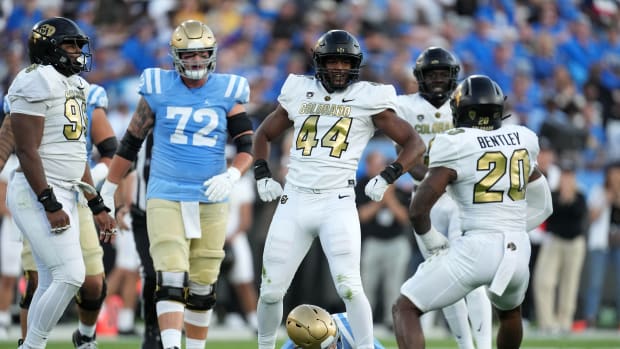Michigan State Had No Choice But to Act Fast With Mel Tucker
Content warning: This story contains graphic language of a sexual nature.
Until this weekend, there were questions about whether Michigan State could afford to fire Mel Tucker, who signed a $95-million contract in 2021. By Sunday, Michigan State could not afford to keep him. For the sake of the school, for the community, for anybody with a sense of recent history, Tucker has to go.
As USA Today detailed Saturday, highly respected survivors’ advocate Brenda Tracy accused Tucker of sexual harassment in a December 2022 Title IX complaint filed with the school. The accused offenses included masturbating during a phone conversation, asking her, If I wasn’t a football coach and if I wasn’t married, would you date me? and inviting her to his hotel room. Tucker said Tracy distorted “our mutually consensual and intimate relationship.”
The school announced Sunday that it has suspended Tucker without pay. Firing him is the only acceptable next step.
Michigan State cannot tell its students that it has learned its lessons about power, sexual harassment and sexual assault, and also say that Tucker is the best person to lead its football program. This isn’t about legal guilt (Tucker has not been accused of a crime) or even whether MSU has the justification to fire Tucker for cause.
This is about credibility. Tucker’s is shot. Michigan State needs to salvage its own.
The community needs to believe that MSU is a welcoming place where survivors are empowered, the truth is sought and leaders establish a culture of proper workplace conduct. Letting Tucker coach one more day would severely damage that belief.
According to USA Today, Tucker told investigators, “I did not engage in misconduct by any definition.” But Tucker doesn’t get to define misconduct. These are facts: He brought a survivors’ rights advocate in to talk to his team, befriended her, called her frequently and tried to start an intimate relationship with her. She says this was against her wishes.
I am struggling to understand how a person in power can ask, If I wasn’t married, would you date me? and claim the relationship was appropriate and mutual. Why ask that if something is already happening between the two of you? And if something wasn’t happening, how can you justify asking that?
Michigan State had to act fast, in part because of its history of not acting fast enough. It is obviously not Tucker’s fault that the school botched its chance to catch notorious pedophile Larry Nassar and then mismanaged the fallout. No reasonable person would compare the allegations against Tucker to what Nassar did. Nassar’s crimes are not relevant here, but MSU’s actions regarding Nassar are highly relevant.
In 2014, Michigan State conducted its Title IX investigation of Nassar—and allowed him to choose one of the doctors who would ultimately clear him. It let him practice for 16 months while he was being investigated. The school told Nassar he needed to have a chaperone in the room during "sensitive" treatments, which remains astounding. If a doctor needs a chaperone in the room, he shouldn’t be your doctor.
When the Nassar story broke, MSU continually treated it like a PR and legal issue instead of a human one. The school’s president at the time, Lou Anna Simon, said it was “virtually impossible to stop a determined sexual predator and pedophile” and skipped most of the court testimony from survivors. Her interim replacement, former Michigan Governor John Engler, said some survivors were “enjoying” the “spotlight.” The school’s most powerful trustee, Joel Ferguson, said the board had a lot more to discuss than “just this Nassar thing.”
Again, not one bit of that is Tucker’s fault. He wasn’t even working at MSU at the time. But it reinforces why Michigan State—the school and community—is better off with another football coach.

Brenda Tracy, left, stands next to Mel Tucker at the Michigan State spring game on April 16, 2022.
Nick King/USA TODAY NETWORK
The school’s personal-conduct rules for employees declare that “behavior of a sexual nature that is not sexual harassment may, nonetheless, be unprofessional in the workplace.” Tucker was clearly unprofessional in the workplace. According to USA Today, he told investigators that he heard an ESPN reporter was looking into the veracity of Tracy’s story that she was gang-raped by four men (two Oregon State University football players, a junior college player and a high school recruit). Tucker said it made him question how she “goes about her business.” The ESPN reporter, Paula Lavigne, denied that she was ever investigating Tracy.
How could Michigan State employ a head football coach who casts doubt on the credibility of a survivors’ advocate’s story of being gang-raped? How is that any better than what John Engler or Joel Ferguson said?
By Sunday morning, Michigan State was looking at a series of unpleasant options. Firing Tucker for cause could bring a lawsuit. Honoring his contract would mean paying millions to a coach who was pushed out of his job because of a sexual-harassment allegation. Refusing to pay would lead to charges that Tucker was fired for his win-loss record, and the school just used Tracy’s allegations as an excuse.
Michigan State chose to suspend Tucker without pay while it finishes its Title IX investigation. A final decision will be made after a formal hearing, scheduled for the week of Oct. 5, is complete. The suspension could save the school millions, but it also raises questions about why the investigation has taken so long. Tracy filed her complaint nine months ago.
This probably should have ended earlier. But the most important thing is that it ends properly. Michigan State has to fire Mel Tucker.







